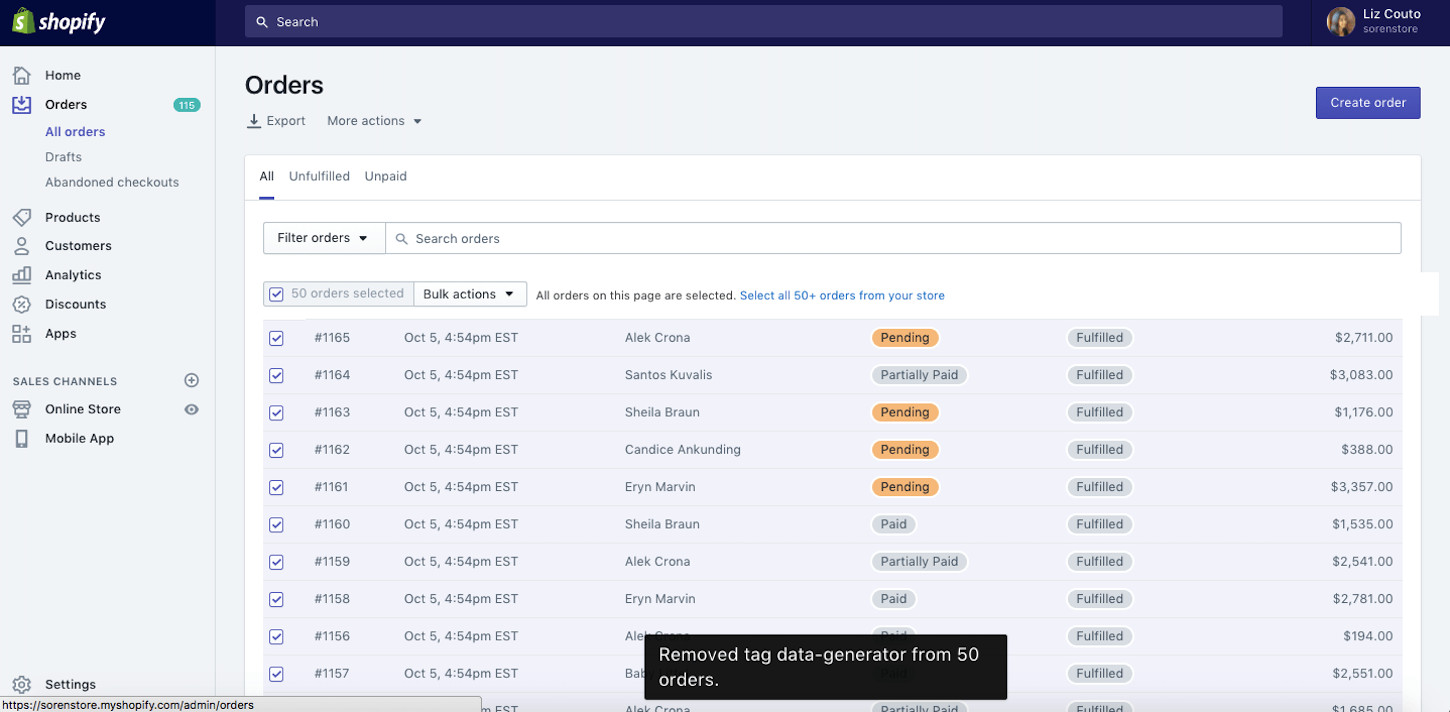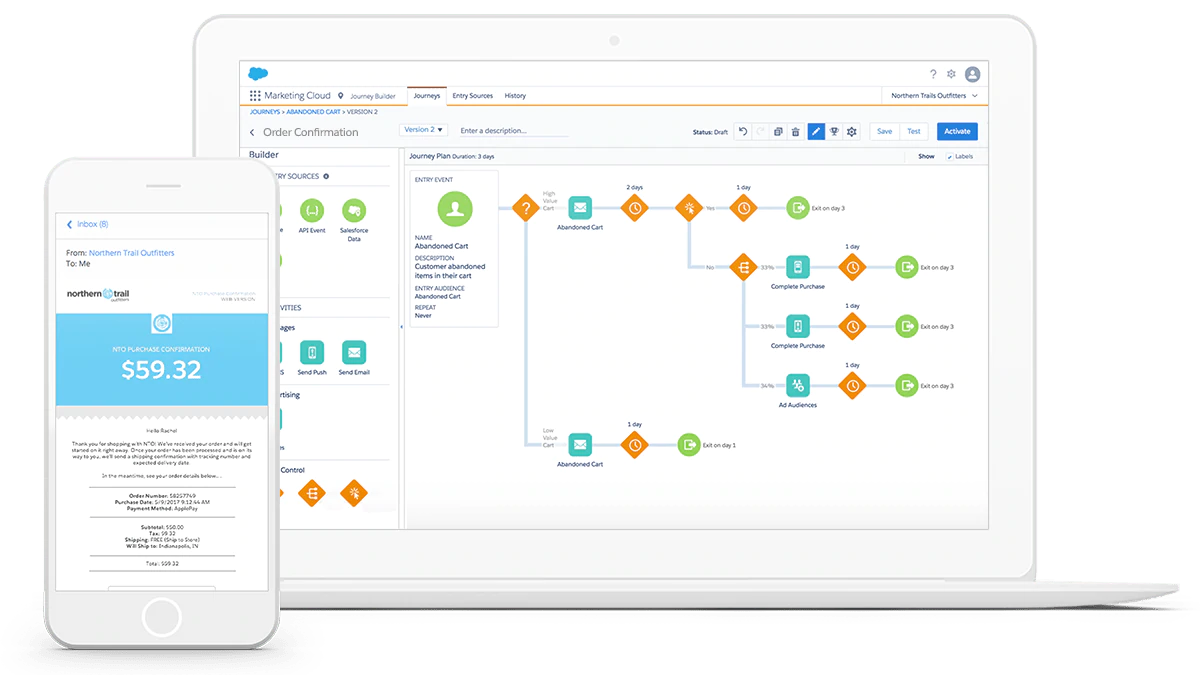The growing capabilities of the internet have made it possible for businesses of all sizes, as well as individual entrepreneurs, to find success without having to leave home. Online stores have become more common as having internet access means gaining entrance to a world of customers. This evolution has triggered a change in B2C practices.
One of the most notable changes is SaaS, or Software as a Service, which helps in building business resilience. It also helps your company grow consistently while also improving your agility and flexibility. In this article, you’ll be getting to know two of the biggest brands in SaaS for eCommerce markets, Shopify Plus, and Salesforce Commerce Cloud.
Shopify has recently become a more popular choice for business owners looking for an eCommerce platform. On the other hand, Salesforce Commerce Cloud is a higher-end option thanks to its ability to compete alongside bigger brands like IBM and SAP. This Shopify vs Salesforce Commerce Cloud comparison will delve deep into each platform’s strengths and weaknesses in hopes of helping you and your team choose the best option for you.
Shopify vs Salesforce Commerce Cloud: Introduction
If you have the chance to read our article, you’ll find out just how important eCommerce software can be. However, you shouldn’t settle for any platform you find. You need to make sure that your choice is equipped with the right features so that you can ensure that it can match your needs. This is where the discussion on Shopify and Salesforce Commerce Cloud’s strengths comes in.
Shopify began as a small and medium enterprise platform in 2006. In the span of eight years, this eCommerce platform has grown into a solution that manages to provide for the needs of enterprise-level businesses. The company rode this success until Shopify Plus was both created and launched, which became the turning point they needed to infiltrate the bigger market.
Whereas Shopify targets newly established businesses as well as medium businesses, Salesforce Commerce Cloud serves clients from the enterprise industry. In 2016, this platform gained its current name primarily because of its commitment to focus on taking advantage of the capabilities of the cloud. As such, this platform dominates the competition when it comes to omnichannel retail – an area that Shopify has yet to infiltrate.
Strengths
Shopify Strengths

Considering the history, Shopify has enjoyed massive growth in the past few years, and it shows in the key strengths of their eCommerce platform. The first of its many strengths is that it comes equipped with a long list of built-in features. Among these features are:
- Flexible Tagging
- Marketplace and Social Media Integrations
- Digital Pay Support (Apple and Google)
- Wholesale Features
- Address Check
These native features ensure that you and your team can take advantage of Shopify’s capabilities with minimal training. Coincidentally, these features are more than enough for B2C and retailing activities.
Shopify also provides advanced functionalities, such as efficient search functions and loyalty programs. Furthermore, this platform also provides you and your team to access customer and client reviews, which can significantly help in improving your business strategies. Finally, Shopify enables you to continuously improve your online store through its powerful customization tools.
Salesforce Commerce Cloud Strengths
 To emphasize their purpose, Salesforce Commerce Cloud is equipped with features that Shopify lacks in implementation. For one, this software is equipped with order management, which ensures that you and your team are able to keep track of not only online orders but also those made in-store.
To emphasize their purpose, Salesforce Commerce Cloud is equipped with features that Shopify lacks in implementation. For one, this software is equipped with order management, which ensures that you and your team are able to keep track of not only online orders but also those made in-store.
For another, Salesforce Commerce Cloud also comes equipped with inventory allocation, which, if you check this, is essential in successfully operating omnichannel retailing as well as implementing effective sales strategies.
Speaking of omnichannel, Salesforce Commerce Cloud further improves you and your team’s experience by providing the following features:
- In-store Online Merchandising
- In-Store Online Promotions
- Remote Inventory Checking
- Point-of-Sale Integrations
These features enable you and your team to provide the convenience and experience of online merchandising in physical stores, which improves customer experience and satisfaction.
Weaknesses
Both Shopify and Salesforce Commerce Cloud face similar weaknesses, especially when it comes to what these platforms have had to sacrifice in order to achieve their respective goals.
Customization
If you compare website builder software in this guide to the capabilities of Shopify, it becomes clear that this platform suffers from customization. Furthermore, Shopify also significantly falls behind Salesforce Commerce Cloud when it comes to projects and business strategies that require a longer launch timeframe. Finally, this platform cannot achieve the same level of handling that Salesforce Commerce Cloud offers in terms of complex processes.
Considering its weaknesses, Shopify makes up for it with a more reasonable pricing package. It’s also the best option for those looking for a solution that is meant to help in simple but essential functionalities as well as rapid launch timeframes.
Limited integrations
Salesforce Commerce Cloud has the opposite problem. This platform provides more extensible customization tools. However, it should be noted that despite having more tools, Salesforce Commerce Cloud also suffers from limiting integrations to bespoke third-party apps and software.
Despite the confidence inspired by the platform design, Salesforce Commerce Cloud notably lacks 24/7 support, which may be essential especially because it can complete complex tasks. The lack of constant customer support may be most felt when the platform fails. This is a likely possibility, especially considering that the developers behind this software had to re-write the Salesforce code in its entirety.
Scalability
Beyond considering the pros and cons as well as features of your preferred platform, another thing you need to look for is the level of scalability that they offer. Without a scalable design, you will need to look for another software that can give your growing business what it needs.
Businesses that have been relying on the help of Shopify can attest to this platform’s scalability. Whether you’re earning a thousand or a million dollars in revenue or selling tens of thousands of products. Shopify has grown enough to promise scalability.
In addition, Shopify also offers further features thanks to its growth. These additions include:
- Multi-Store Support
- International Store Support
- Third-Party Payment Support
- Flexible Catalog
- API Integration
These tools enable the platform to support you and your company’s growth, no matter how slow or fast it may be.
Aside from its massive list of built-in features, Shopify also offers platform flexibility. This strength relates back, in part, to the API integration. This feature allows you and your team to integrate all the apps and software that you use to complete your tasks. Furthermore, it also opens up a rare opportunity in which you can develop your own apps without having to worry about whether or not Shopify will support it, which something that can happen once your business begins to cater to more consumer needs.
On the other hand, Salesforce Commerce Cloud’s scalability feature is its robust and reliable platform. This strength shows in how it is designed to handle extensive integrations and complex processes that become more and more common as your business grows.
This design is why, even beyond this Shopify vs Salesforce Commerce Cloud comparison, Salesforce Commerce Cloud edges out most of its competition. To promote further confidence, Salesforce Commerce Cloud ensures that the developers are within reach, whether by technical or management support – a necessity if you want to stop worrying about your platform and start focusing on furthering your business.
Consistent with its goal to achieve complex processes, Salesforce Commerce Cloud also excels in features and tools that revolve around merchandising. With this software, you won’t have to worry about implementing or building a large and complex catalog.
Moreover, it enables you to take advantage of visual merchandising, Einstein machine learning, and 1:1 personalization – tools that not only support company growth but also market satisfaction.
Pricing
To fully illustrate the differences between both platforms, this Shopify vs Salesforce Commerce Cloud comparison continues by illustrating the cost of each.
Shopify bases its pricing package on business revenue. Retailers who earn $800,000 or less will need to pay a seemingly hefty price of $2,000 per month. This price tag increases when your GMV increases. Shopify also charges an additional $1,000, on average, should you need integration with third-party apps. Finally, the design and development, as well as BAU of Shopify, can also yield $80,000 to $300,000 and $60,000 to $180,000 per month, respectively.
On the other hand, Salesforce Commerce Cloud bases its pricing on a per-client standpoint. Retailers who earn $20 million or less can expect to pay $350,000 to $600,000 per year even without the additional charges that come with establishing new stores. From most of their clients’ experience, it is more than likely that the total bill equates to $500,000 to $1.5 million in a single year.
Thus, in terms of pricing, Shopify definitely takes the lead. However, you must remember that Shopify targets smaller businesses compared to Salesforce Commerce Cloud’s target market that is comprised of large enterprises.
Shopify vs Salesforce Commerce Cloud: Your Choice
Given the strengths and weaknesses of both platforms, all that’s left for you to do is to choose between Shopify or Salesforce Commerce Cloud. Both these platforms are excellent for sales and eCommerce.
However, if your business is still growing and you’re within the small and medium business category, then Shopify will be the more attractive choice. On the other hand, if you operate multiple franchises or branches of your business or if you fall into the large enterprise category, then Salesforce Commerce Cloud will inspire the most confidence.
Try to learn what Shopify and Salesforce Commerce Cloud customers say about these respective platforms; it can give you the insight you need to make the final decision.
